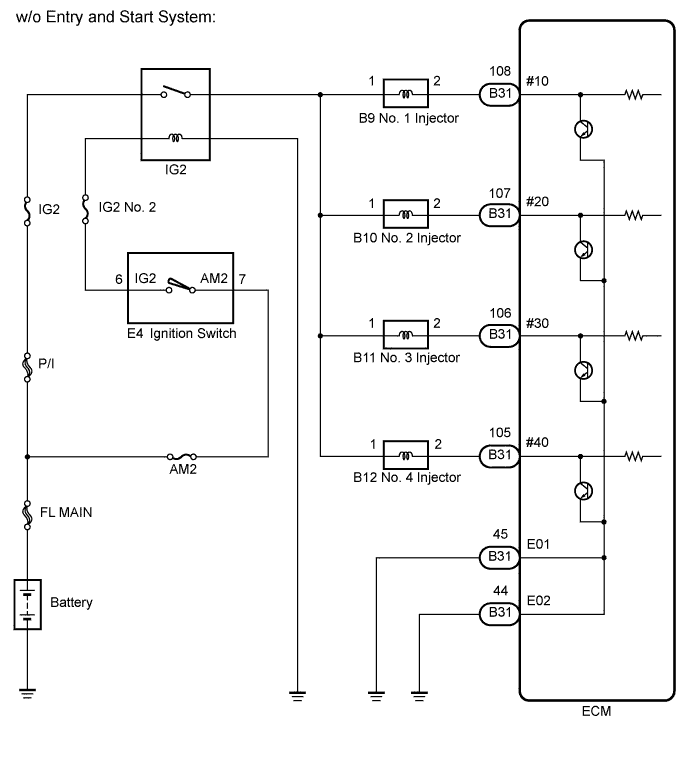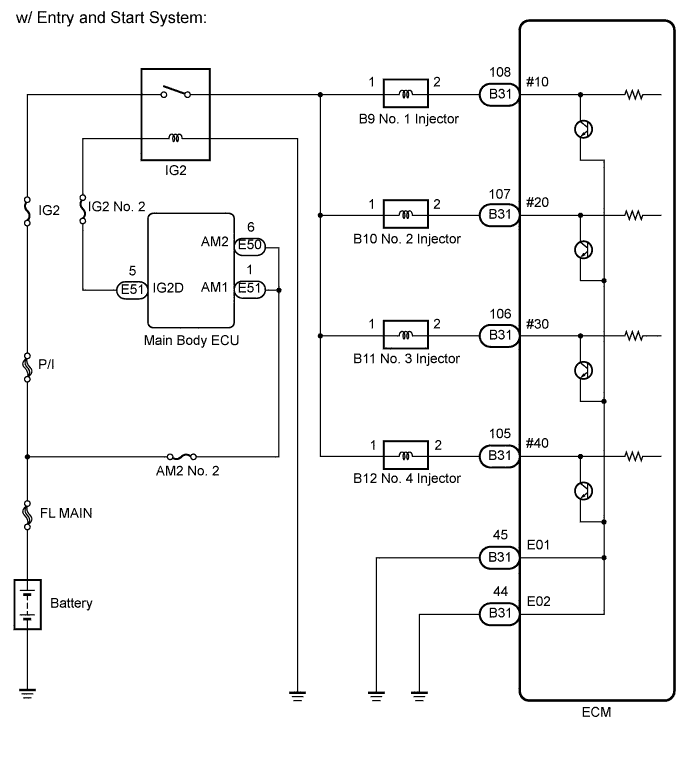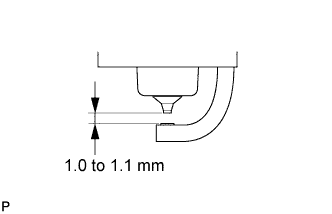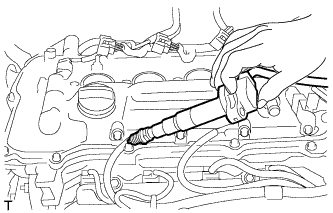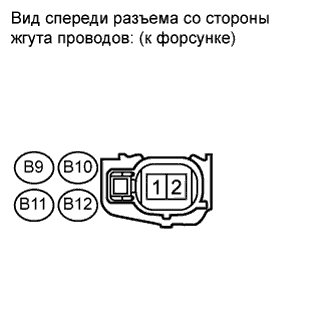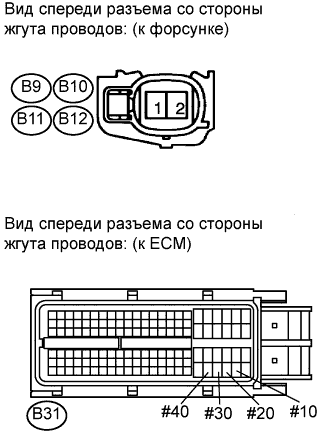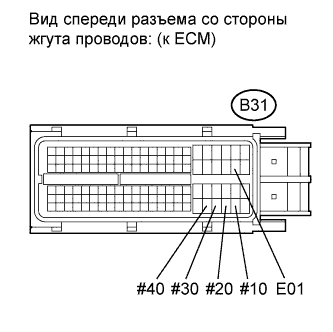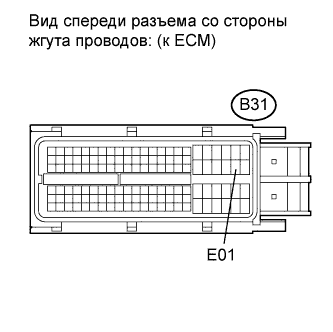Двигатель. COROLLA, AURIS. ZZE150 ZRE151,152 NDE150
DESCRIPTION
WIRING DIAGRAM
CONFIRMATION DRIVING PATTERN
INSPECTION PROCEDURE
CHECK ANY OTHER DTCS OUTPUT (IN ADDITION TO MISFIRE CODES)
READ VALUE OF INTELLIGENT TESTER (MISFIRE RPM AND MISFIRE LOAD)
CHECK PCV HOSE CONNECTIONS
READ VALUE OF INTELLIGENT TESTER
CHECK SPARK PLUG
CHECK FOR SPARK AND IGNITION
CHECK CYLINDER COMPRESSION PRESSURE OF MISFIRING CYLINDER
CHECK INJECTOR ASSEMBLY (POWER SOURCE)
CHECK HARNESS AND CONNECTOR (INJECTOR ASSEMBLY - ECM)
INSPECT ECM TERMINAL OF MISFIRING CYLINDER (#10, #20, #30 AND/OR #40 VOLTAGE)
CHECK FUEL INJECTOR OF MISFIRING CYLINDER
CHECK INTAKE SYSTEM
CHECK FUEL PRESSURE
READ VALUE OF INTELLIGENT TESTER (COOLANT TEMP)
READ VALUE OF INTELLIGENT TESTER (MASS AIR FLOW METER)
ADJUST VALVE TIMING
CHECK WHETHER DTC OUTPUT RECURS (DTC P0300, P0301, P0302, P0303 AND/OR P0304)
CHECK INTAKE SYSTEM
CHECK FUEL PRESSURE
READ VALUE OF INTELLIGENT TESTER (COOLANT TEMP)
READ VALUE OF INTELLIGENT TESTER (MASS AIR FLOW METER)
ADJUST VALVE TIMING
CHECK WHETHER DTC OUTPUT RECURS (DTC P0300, P0301, P0302, P0303 AND/OR P0304)
CHECK SPARK PLUG
CHECK FOR SPARK AND IGNITION (SPARK TEST)
CHECK CYLINDER COMPRESSION PRESSURE OF MISFIRING CYLINDER
CHECK INJECTOR ASSEMBLY (POWER SOURCE)
CHECK HARNESS AND CONNECTOR (INJECTOR ASSEMBLY - ECM)
INSPECT ECM TERMINAL OF MISFIRING CYLINDER (#10, #20, #30 AND/OR #40 VOLTAGE)
CHECK FUEL INJECTOR OF MISFIRING CYLINDER
CHANGE TO NORMAL SPARK PLUG AND CHECK SPARK OF MISFIRING CYLINDER
CHANGE TO NORMAL IGNITION COIL AND CHECK SPARK OF MISFIRING CYLINDER
CHECK HARNESS AND CONNECTOR (ECM - BODY GROUND)
CHECK FUEL LINE
DTC P0300 Random / Multiple Cylinder Misfire Detected |
DTC P0301 Cylinder 1 Misfire Detected |
DTC P0302 Cylinder 2 Misfire Detected |
DTC P0303 Cylinder 3 Misfire Detected |
DTC P0304 Cylinder 4 Misfire Detected |
DESCRIPTION
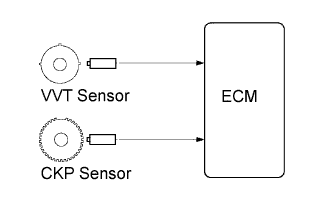 When the engine misfires, high concentrations of hydrocarbons enter the exhaust gas. Extremely high hydrocarbon concentration levels can cause increases in exhaust emission levels. High concentrations of hydrocarbons can also cause increases in the three way catalytic converter temperature, which may cause damage to the three way catalytic converter. To prevent these increases in emissions and to limit the possibility of thermal damage, the ECM monitors the misfire rate. When the temperature of the three way catalytic converter reaches the point of thermal degradation, the ECM blinks the MIL. To monitor misfires, the ECM uses both the camshaft position sensor and the crankshaft position sensor. The camshaft position sensor is used to identify any misfiring cylinders and the crankshaft position sensor is used to measure variations in the crankshaft rotation speed. Misfires are counted as when the crankshaft rotation speed variations exceed predetermined thresholds. If the misfire rate exceeds the threshold level and could cause emission deterioration, the ECM illuminates the MIL and sets a DTC.
When the engine misfires, high concentrations of hydrocarbons enter the exhaust gas. Extremely high hydrocarbon concentration levels can cause increases in exhaust emission levels. High concentrations of hydrocarbons can also cause increases in the three way catalytic converter temperature, which may cause damage to the three way catalytic converter. To prevent these increases in emissions and to limit the possibility of thermal damage, the ECM monitors the misfire rate. When the temperature of the three way catalytic converter reaches the point of thermal degradation, the ECM blinks the MIL. To monitor misfires, the ECM uses both the camshaft position sensor and the crankshaft position sensor. The camshaft position sensor is used to identify any misfiring cylinders and the crankshaft position sensor is used to measure variations in the crankshaft rotation speed. Misfires are counted as when the crankshaft rotation speed variations exceed predetermined thresholds. If the misfire rate exceeds the threshold level and could cause emission deterioration, the ECM illuminates the MIL and sets a DTC.DTC No.
| DTC Detection Condition
| Trouble Area
|
P0300
| Simultaneous misfiring of several cylinders detected
(2-trip detection logic)
| - Open or short in engine wire harness
- Connector connection
- Vacuum hose connections
- Ignition system
- Injector
- Fuel pressure
- Mass air flow meter
- Engine coolant temperature sensor
- Compression pressure
- Valve timing
- PCV valve and hose
- PCV hose connection
- Intake system
- ECM
|
P0301
P0302
P0303
P0304
| Misfiring of specific cylinder detected
(2-trip detection logic)
|
When DTCs for misfiring cylinders are randomly set, but DTC P0300 is not set, it indicates that misfires have been detected in different cylinders at different times. DTC P0300 is only set when several misfiring cylinders are detected at the same time.
WIRING DIAGRAM
CONFIRMATION DRIVING PATTERN
- Connect the intelligent tester to the DLC3.
- Turn the ignition switch on (IG).
- Turn the tester on.
- Record the DTC(s) and freeze frame data.
- Using the tester, switch the ECM from normal mode to check mode (See page Нажмите здесь).
- Read the misfire counts of each cylinder (Cylinder #1 to #4) with the engine in an idling condition. If any misfire count is displayed, skip the following confirmation driving pattern.
- Drive the vehicle several times with the conditions, such as engine rpm and engine load, shown in Misfire RPM and Misfire Load in the Data List.
- УКАЗАНИЕ:
- In order to store misfire DTCs, it is necessary to operate the vehicle for the period of time shown in the table below, using the Misfire RPM and Misfire Load in the Data List.
Engine RPM
| Duration
|
Idling
| 8 minutes or more
|
1000
| 4 minutes 30 seconds or more
|
2000
| 2 minutes 30 seconds or more
|
3000
| 1 minute 30 seconds or more
|
- Check whether misfires have occurred by checking DTCs and freeze frame data.
- УКАЗАНИЕ:
- Do not turn the ignition switch off until the stored DTC(s) and freeze frame data have been recorded. When the ECM returns to normal mode (default), the stored DTC(s), freeze frame data and other data will be erased.
- Record the DTC(s), freeze frame data and misfire counts.
- Turn the ignition switch off and wait for at least 5 seconds.
INSPECTION PROCEDURE
- УКАЗАНИЕ:
- If any DTCs other than misfire DTCs are output, troubleshoot those DTCs first.
- Read freeze frame data using the intelligent tester. The ECM records vehicle and driving condition information as freeze frame data the moment a DTC is stored. When troubleshooting, freeze frame data can help determine if the vehicle was moving or stationary, if the engine was warmed up or not, if the air fuel ratio was lean or rich, and other data from the time the malfunction occurred.
- If the misfire does not recur when the vehicle is brought to the workshop, reproduce the conditions stored in the freeze frame data.
- If the misfire still cannot be reproduced even though the conditions stored in the freeze frame data have been duplicated, one of the following factors is considered to be a possible cause of the problem:
- The fuel level is low.
- Improper fuel is used.
- The spark plugs are dirty.
- The problem is complex and involves multiple factors.
- After finishing repairs, check that no misfire occurs in each cylinder (Cylinder #1, #2, #3 and #4).
- Be sure to confirm that no misfiring cylinder DTCs are set again by conducting the confirmation driving pattern after the repairs.
- When either Short FT #1 or Long FT #1 values in the freeze frame data is not within 20% of the central value, the air fuel ratio may be rich (-20% or less) or lean (+20% or more).
- When the Coolant Temp in the freeze frame data is less than 75°C (167°F), the misfires occurred only while warming up the engine.
| 1.CHECK ANY OTHER DTCS OUTPUT (IN ADDITION TO MISFIRE CODES) |
Connect the intelligent tester to the DLC3.
Turn the ignition switch on (IG).
Turn the tester on.
Select the following menu items: Powertrain / Engine and ECT / DTC.
Read the DTCs.
- Result:
Display (DTC Output)
| Proceed to
|
P0300, P0301, P0302, P0303 and/or P0304
| A
|
P0300, P0301, P0302, P0303 and/or P0304 and other DTCs
| B
|
- УКАЗАНИЕ:
- If any DTCs other than P0300, P0301, P0302, P0303 and P0304 are output, troubleshoot those DTCs first.
| 2.READ VALUE OF INTELLIGENT TESTER (MISFIRE RPM AND MISFIRE LOAD) |
Connect the intelligent tester to the DLC3.
Turn the ignition switch on (IG) and turn the tester on.
Select the following menu items: Powertrain / Engine and ECT / Data List / Misfire RPM and Misfire Load.
Read and note the Misfire RPM and Misfire Load values.
- УКАЗАНИЕ:
- The Misfire RPM and Misfire Load values indicate the vehicle conditions under which the misfire occurred.
| 3.CHECK PCV HOSE CONNECTIONS |
- OK:
- PCV hose is correctly connected and is not damaged.
| | REPAIR OR REPLACE PCV HOSE |
|
|
| 4.READ VALUE OF INTELLIGENT TESTER |
Connect the intelligent tester to the DLC3.
Turn the ignition switch on (IG).
Turn the tester on (Step "C").
Enter the following menu items: Powertrain / Engine and ECT / Data List / Cylinder #1 (to #4) Misfire Count (Step "D").
Read each value for Cylinder #1 to #4 displayed on the tester. If no misfire counts occur in any cylinders, perform the following procedures:
Start the engine and let it idle.
Move the shift lever to the D position.
Check Cylinder #1 to #4.
If misfire counts are still not displayed, perform steps ("C") and ("D").
Drive the vehicle with the Misfire RPM and Misfire Load noted in the "READ VALUE USING INTELLIGENT TESTER (Misfire RPM and Misfire Load)" procedures above.
Read Cylinder #1 to #4 or the DTCs displayed on the tester.
- Result:
Misfire Count
| Proceed to
|
Most misfires occur in only 1 or 2 cylinders
| A
|
3 cylinders or more have equal misfire counts
| B
|
- УКАЗАНИЕ:
- If it is difficult to reproduce misfires for each cylinder, check the Data List item called Misfire Margin. Try to find vehicle driving conditions that lower the Misfire Margin value. Values above 30% are considered normal.
- If the freeze frame data's record of the engine coolant temperature is below 75°C (167°F), the misfire may be detected only when the engine is cold.
- If the freeze frame data's record of the Engine Run Time is below 120 seconds, the misfire may be detected immediately after the engine is started.
Remove the ignition coil and the spark plug of the misfiring cylinder.
Measure the spark plug electrode gap.
- Maximum gap:
- 1.0 to 1.1 mm (0.039 to 0.043 in.)
Check the electrode for carbon deposits.
Recommended spark plug:Manufacturer
| Product
|
DENSO
| SC20HR11
|
- ПРИМЕЧАНИЕ:
- If the electrode gap is larger than standard, replace the spark plug. Do not adjust the electrode gap.
Reinstall the ignition coil and the spark plug.
| 6.CHECK FOR SPARK AND IGNITION |
Perform a spark test.
- ПРЕДОСТЕРЕЖЕНИЕ:
- During the test, disconnect all the fuel injector connectors.
- ПРИМЕЧАНИЕ:
- Do not crank the engine for more than 2 seconds.
Remove the ignition coil from the cylinder head.
Install the spark plug onto the ignition coil.
Disconnect the 4 fuel injector connectors.
Touch the spark plug assembly to the cylinder head.
Crank the engine for less than 2 seconds and check for spark.
- OK:
- Sparks jump across electrode gap.
Reconnect the 4 fuel injector connectors.
Install the ignition coil.
| 7.CHECK CYLINDER COMPRESSION PRESSURE OF MISFIRING CYLINDER |
Measure the cylinder compression pressure of the misfiring cylinder (See page Нажмите здесь).
| | CHECK ENGINE TO DETERMINE CAUSE OF LOW COMPRESSION |
|
|
| 8.CHECK INJECTOR ASSEMBLY (POWER SOURCE) |
Disconnect the injector assembly connector.
Turn the ignition switch on (IG).
Measure the voltage according to the value(s) in the table below.
- Standard voltage:
Tester Connection
| Switch Condition
| Specified Condition
|
B9-1 - Body ground
| Ignition switch on (IG)
| 9 to 14 V
|
B10-1 - Body ground
| Ignition switch on (IG)
| 9 to 14 V
|
B11-1 - Body ground
| Ignition switch on (IG)
| 9 to 14 V
|
B12-1 - Body ground
| Ignition switch on (IG)
| 9 to 14 V
|
Reconnect the ignition switch connector.
| | CHECK FUEL INJECTOR CIRCUIT |
|
|
| 9.CHECK HARNESS AND CONNECTOR (INJECTOR ASSEMBLY - ECM) |
Disconnect the injector assembly connector.
Disconnect the ECM connector.
Measure the resistance according to the value(s) in the table below.
- Standard resistance (Check for open):
Tester Connection
| Condition
| Specified Condition
|
B9-2 - B31-108 (#10)
| Always
| Below 1 Ω
|
B10-2 - B31-107 (#20)
| Always
| Below 1 Ω
|
B11-2 - B31-106 (#30)
| Always
| Below 1 Ω
|
B12-2 - B31-105 (#40)
| Always
| Below 1 Ω
|
- Standard resistance (Check for short):
Tester Connection
| Condition
| Specified Condition
|
B9-2 or B31-108 (#10) - Body ground
| Always
| 10 kΩ or higher
|
B10-2 or B31-107 (#20) - Body ground
| Always
| 10 kΩ or higher
|
B11-2 or B31-106 (#30) - Body ground
| Always
| 10 kΩ or higher
|
B12-2 or B31-105 (#40) - Body ground
| Always
| 10 kΩ or higher
|
Reconnect the injector connector.
Reconnect the ECM connector.
| | REPAIR OR REPLACE HARNESS OR CONNECTOR (INJECTOR ASSEMBLY - ECM) |
|
|
| 10.INSPECT ECM TERMINAL OF MISFIRING CYLINDER (#10, #20, #30 AND/OR #40 VOLTAGE) |
Disconnect the ECM connector.
Turn the ignition switch on (IG).
Measure the voltage according to the value(s) in the table below.
- Standard voltage:
Tester Connection
| Switch Condition
| Specified Condition
|
B31-108 (#10) - B31-45 (E01)
| Ignition switch on (IG)
| 9 to 14 V
|
B31-107 (#20) - B31-45 (E01)
| Ignition switch on (IG)
| 9 to 14 V
|
B31-106 (#30) - B31-45 (E01)
| Ignition switch on (IG)
| 9 to 14 V
|
B31-105 (#40) - B31-45 (E01)
| Ignition switch on (IG)
| 9 to 14 V
|
Reconnect the ECM connector.
| 11.CHECK FUEL INJECTOR OF MISFIRING CYLINDER |
Check the injector injection (whether fuel volume is high or low, and whether injection pattern is poor) (See page Нажмите здесь).
Check the intake system for vacuum leakage (See page Нажмите здесь).
- OK:
- No leakage from intake system.
| | REPAIR OR REPLACE INTAKE SYSTEM |
|
|
Check the fuel pressure (See page Нажмите здесь).
| 14.READ VALUE OF INTELLIGENT TESTER (COOLANT TEMP) |
Connect the intelligent tester to the DLC3.
Turn the ignition switch on (IG).
Turn the tester on.
Select the following menu items: Powertrain / Engine and ECT / Data List / Coolant Temp.
Read the Coolant Temp twice, when the engine is both cold and warmed up.
- Standard:
- With cold engine:
- Same as ambient air temperature.
- With warm engine:
- Between 75°C and 95°C (167°F and 203°F).
| 15.READ VALUE OF INTELLIGENT TESTER (MASS AIR FLOW METER) |
Connect the intelligent tester to the DLC3.
Turn the ignition switch on (IG).
Turn the tester on.
Select the following menu items: Powertrain / Engine and ECT / Data List / MAF and Coolant Temp.
Allow the engine to idle until the Coolant Temp reaches 75°C (167°F) or more.
Read the MAF value with the engine at idle and also at 2500 rpm.
- Standard:
- MAF value while engine is idling:
- Between 0.54 g/s and 4.33 g/s (shift position: N, A/C: OFF).
- MAF value at engine speed of 2500 rpm:
- Between 3.33 g/s and 9.17 g/s (shift position: N, A/C: OFF).
- УКАЗАНИЕ:
- There are no marks on the cylinder head for the purpose of checking valve timing. Valve timing can only be inspected by lining up the colored links on the timing chain with the marks on the pulleys. It may be necessary to remove and re-install the chain to match up the timing marks (See page Нажмите здесь).
| 17.CHECK WHETHER DTC OUTPUT RECURS (DTC P0300, P0301, P0302, P0303 AND/OR P0304) |
Connect the intelligent tester to the DLC3.
Turn the ignition switch on (IG).
Turn the tester on.
Clear the DTCs (See page Нажмите здесь).
Start the engine and warm it up.
Switch the ECM from normal mode to check mode using the tester.
Run the engine at an engine speed of 1000 rpm for 3 minutes.
Select the following menu items: Powertrain / Engine and ECT / DTC.
Read the DTCs.
- Result:
Result
| Proceed to
|
DTC is not output
| A
|
DTC P0300, P0301, P0302, P0303 and/or P0304 are output
| B
|
Check the intake system for vacuum leakage (See page Нажмите здесь).
- OK:
- No leakage from intake system.
| | REPAIR OR REPLACE INTAKE SYSTEM |
|
|
Check the fuel pressure (See page Нажмите здесь).
| 20.READ VALUE OF INTELLIGENT TESTER (COOLANT TEMP) |
Connect the intelligent tester to the DLC3.
Turn the ignition switch on (IG).
Turn the tester on.
Select the following menu items: Powertrain / Engine and ECT / Data List / Coolant Temp.
Read the Coolant Temp twice, when the engine is both cold and warmed up.
- Standard:
- With cold engine:
- Same as ambient air temperature.
- With warm engine:
- Between 75°C and 95°C (167°F and 203°F).
| 21.READ VALUE OF INTELLIGENT TESTER (MASS AIR FLOW METER) |
Connect the intelligent tester to the DLC3.
Turn the ignition switch on (IG).
Turn the tester on.
Select the following menu items: Powertrain / Engine and ECT / Data List / MAF and Coolant Temp.
Allow the engine to idle until the Coolant Temp reaches 75°C (167°F) or more.
Read the MAF value with the engine at idle and also at 2500 rpm.
- Standard:
- MAF value while engine is idling:
- Between 0.54 g/s and 4.33 g/s (shift position: N, A/C: OFF).
- MAF value at engine speed of 2500 rpm:
- Between 3.33 g/s and 9.17 g/s (shift position: N, A/C: OFF).
- УКАЗАНИЕ:
- There are no marks on the cylinder head match-up for the purpose of checking valve timing. Valve timing can only be inspected by lining up the colored plates on the timing chain with the marks on the pulleys. It may be necessary to remove and re-install the chain to match up the timing marks (See page Нажмите здесь).
| 23.CHECK WHETHER DTC OUTPUT RECURS (DTC P0300, P0301, P0302, P0303 AND/OR P0304) |
Connect the intelligent tester to the DLC3.
Turn the ignition switch on (IG).
Turn the tester on.
Clear the DTCs (See page Нажмите здесь).
Start the engine and warm it up.
Switch the ECM from normal mode to check mode using the tester.
Run the engine at an engine speed of 1000 rpm for 3 minutes.
Select the following menu items: Powertrain / Engine and ECT / DTC.
Read the DTCs.
- Result:
Result
| Proceed to
|
DTC is not output
| A
|
DTC P0300, P0301, P0302, P0303 and/or P0304 are output
| B
|
Remove the ignition coil and the spark plug of the misfiring cylinder.
Measure the spark plug electrode gap.
- Maximum gap:
- 1.0 to 1.1 mm (0.039 to 0.043 in.)
Check the electrode for carbon deposits.
Recommended spark plug:Manufacturer
| Product
|
DENSO
| SC20HR11
|
- ПРИМЕЧАНИЕ:
- If the electrode gap is larger than standard, replace the spark plug. Do not adjust the electrode gap.
Reinstall the ignition coil and the spark plug.
| 25.CHECK FOR SPARK AND IGNITION (SPARK TEST) |
Perform a spark test.
- ПРЕДОСТЕРЕЖЕНИЕ:
- During the test, disconnect all fuel injector connectors.
- ПРИМЕЧАНИЕ:
- Do not crank the engine for more than 2 seconds.
Remove the ignition coil from the cylinder head.
Install the spark plug onto the ignition coil.
Disconnect the 4 fuel injector connectors.
Touch the spark plug assembly to the cylinder head.
Crank the engine for less than 2 seconds and check for spark.
- OK:
- Sparks jump across electrode gap.
Reconnect the 4 fuel injector connectors.
Install the ignition coil.
| 26.CHECK CYLINDER COMPRESSION PRESSURE OF MISFIRING CYLINDER |
Measure the cylinder compression pressure of the misfiring cylinder (See page Нажмите здесь).
| | CHECK ENGINE TO DETERMINE CAUSE OF LOW COMPRESSION |
|
|
| 27.CHECK INJECTOR ASSEMBLY (POWER SOURCE) |
Disconnect the injector assembly connector.
Turn the ignition switch on (IG).
Measure the voltage according to the value(s) in the table below.
- Standard voltage:
Tester Connection
| Switch Condition
| Specified Condition
|
B9-1 - Body ground
| Ignition switch on (IG)
| 9 to 14 V
|
B10-1 - Body ground
| Ignition switch on (IG)
| 9 to 14 V
|
B11-1 - Body ground
| Ignition switch on (IG)
| 9 to 14 V
|
B12-1 - Body ground
| Ignition switch on (IG)
| 9 to 14 V
|
Reconnect the injector assembly connector.
| | CHECK FUEL INJECTOR CIRCUIT |
|
|
| 28.CHECK HARNESS AND CONNECTOR (INJECTOR ASSEMBLY - ECM) |
Disconnect the injector assembly connector.
Disconnect the ECM connector.
Measure the resistance according to the value(s) in the table below.
- Standard resistance (Check for open):
Tester Connection
| Condition
| Specified Condition
|
B9-1 - B31-108 (#10)
| Always
| Below 1 Ω
|
B10-1 - B31-107 (#20)
| Always
| Below 1 Ω
|
B11-1 - B31-106 (#30)
| Always
| Below 1 Ω
|
B12-1 - B31-105 (#40)
| Always
| Below 1 Ω
|
- Standard resistance (Check for short):
Tester Connection
| Condition
| Specified Condition
|
B9-1 or B31-108 (#10) - Body ground
| Always
| 10 kΩ or higher
|
B10-1 or B31-107 (#20) - Body ground
| Always
| 10 kΩ or higher
|
B11-1 or B31-106 (#30) - Body ground
| Always
| 10 kΩ or higher
|
B12-1 or B31-105 (#40) - Body ground
| Always
| 10 kΩ or higher
|
Reconnect the injector connector.
Reconnect the ECM connector.
| | REPAIR OR REPLACE HARNESS OR CONNECTOR (INJECTOR ASSEMBLY - ECM) |
|
|
| 29.INSPECT ECM TERMINAL OF MISFIRING CYLINDER (#10, #20, #30 AND/OR #40 VOLTAGE) |
Disconnect the ECM connector.
Turn the ignition switch on (IG).
Measure the voltage according to the value(s) in the table below.
- Standard voltage:
Tester Connection
| Switch Condition
| Specified Condition
|
B31-108 (#10) - B31-45 (E01)
| Ignition switch on (IG)
| 9 to 14 V
|
B31-107 (#20) - B31-45 (E01)
| Ignition switch on (IG)
| 9 to 14 V
|
B31-106 (#30) - B31-45 (E01)
| Ignition switch on (IG)
| 9 to 14 V
|
B31-105 (#40) - B31-45 (E01)
| Ignition switch on (IG)
| 9 to 14 V
|
Reconnect the ECM connector.
| 30.CHECK FUEL INJECTOR OF MISFIRING CYLINDER |
Check the injector injection (whether fuel volume is high or low, and whether injection pattern is poor) (See page Нажмите здесь).
| 31.CHANGE TO NORMAL SPARK PLUG AND CHECK SPARK OF MISFIRING CYLINDER |
Change the installed spark plug to a spark plug that functions normally.
Perform a spark test.
- ПРЕДОСТЕРЕЖЕНИЕ:
- During the test, disconnect all injector connectors.
- ПРИМЕЧАНИЕ:
- Do not crank the engine for more than 2 seconds.
Install the spark plug onto the ignition coil.
Disconnect the 4 fuel injector connectors.
Touch the spark plug assembly to cylinder head.
Crank the engine for less than 2 seconds and check for spark.
- OK:
- Sparks jump across electrode gap.
| 32.CHANGE TO NORMAL IGNITION COIL AND CHECK SPARK OF MISFIRING CYLINDER |
| 33.CHECK HARNESS AND CONNECTOR (ECM - BODY GROUND) |
Disconnect the ECM connector.
Measure the resistance according to the value(s) in the table below.
- Standard resistance:
Tester Connection
| Condition
| Specified Condition
|
B31-45 (E01) - Body ground
| Always
| Below 1 Ω
|
| | REPAIR OR REPLACE HARNESS OR CONNECTOR (ECM - BODY GROUND) |
|
|
Check the fuel lines for leaks or blockage (See pageНажмите здесь).
| | REPAIR OR REPLACE FUEL LINE |
|
|

